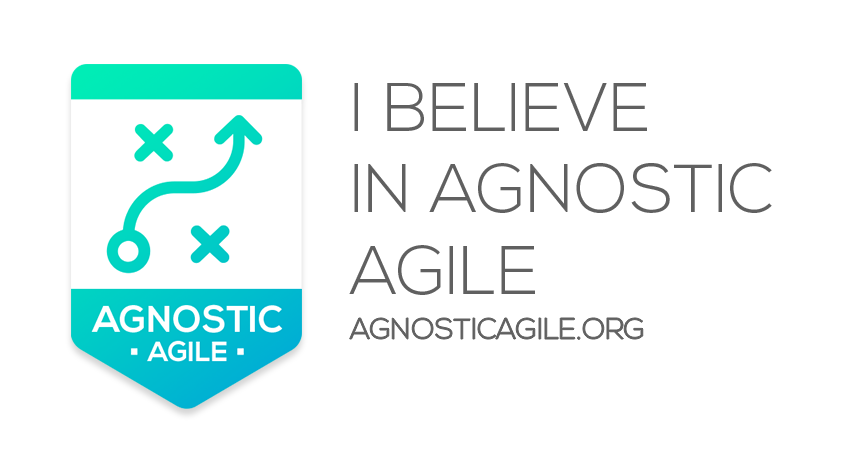There seem to be three types of people in the Agile world.
- The people who view everything through a Scrum lens
- The people who believe it is only an iterative approach to projects
- The people who believe the underlying philosophical values are the most important part of Agile
I am in the third category. I am of the belief that iterative and incremental development on its own isn’t going to do much good for anyone. It isn’t going to make things better than a predictive process. It isn’t going to help you keep and retain employees. In fact, having been on projects where it was only about the iteration (For those in the first category, iteration means Sprint) those projects, quite bluntly, suck to be on.
When I first was introduced to Agile, I hated it. It was a bunch of meetings with tight deadlines and everyone was miserable and slogging along just waiting to get out of work. It made the boring job of programming substantially worse. Things never worked right…. and I can see why there are a lot of people who don’t like Agile. They took the second category view of Agile that I listed above. How is that going to work on an organizational level? Probably pretty horrific.
The problem here is – too many people seem to fall into category 1 and 2. Let’s see if we can change that. Agile is pointless without the philosophical values behind it.
The Agile Manifesto for Software Development
When they named Agile, it seems they didn’t intend to bring this to an organizational level or have it to be used on projects that are not related to software development; but some of the signers of the Agile Manifesto are certainly jumping onboard the Agile organizational shift. Iterative development isn’t really going to do anything for an organization and won’t work for all projects. They are jumping onboard the organizational shift with the philosophical values and principles behind Agile – a loose interpretation of them since the Agile Manifesto frequently mentions software.
Some of those values have an origin. They weren’t invented by the signers of the Agile Manifesto; they just wrote them down based on already existing project frameworks. Actually, around the same time as the Agile Manifesto for Software Development was written, another document was being written on Complexity Leadership Theory that was based on something called Complexity Theory.
Books and Educational Material on Complexity Theory
Complexity Theory
An Overview
Applying Complexity Theory to an Organization (Complex Adaptive Systems)
Complexity Theory for Organizational Development (as stated in the video above)
- Good enough vision
- It is impossible to predict complex systems far out into the future
- Chaos Theory – Sensitive Dependence on Initial Conditions -the smallest change can throw the whole system off in unpredictable ways (Butterfly Effect)
- Start off with broad goals and prepare to adapt to changes
- Minimum Specifications
- Use basic parameters to get where you want to go
- Self-Organization
- Allow people to come together and work with those minimum specifications
- Wicked Questions
- Ask the questions no one wants to ask
- Why are we doing something the way we are doing it
- Shadow Systems
- The hidden rules, the organizational rules that are ignored or modified to get things done
- Move the shadow system into the light and balance the system out
- Emergence
- Emergent interconnection
Complexity in an organization is not neat and siloed off. It doesn’t look like the standard top-down tiers with everyone existing in neat little boxes. It looks more like overlapping and interconnectedness.

Complex Organization Chart Model – Complex Adaptive System
The most widely used leadership models today are rooted in top-down bureaucratic models. While these models are effective in stable, production-oriented economies, they are not wellsuited for the less stable, knowledge-oriented economy that describes the current environment. – Mary Uhl-Bien, Russ Marion, Bill McKelvey
Organizations as Complex Adaptive Systems
Sources
Applying Complexity Science for Organization Development: https://www.youtube.com/watch?v=g13IDarbR_4
Complexity Theory Short Film: https://www.youtube.com/watch?v=lfa752nng90
Organizations as Complex Adaptive Systems: https://www.youtube.com/watch?v=EFv-2SPK2TA
Mary Uhl-Bien, Russ Marion, Bill McKelvey, Complexity Leadership Theory. Retrieved from http://theclariongroup.com/images/GooglePlus-Docs/Complexity-Leadership-Article.pdf.
Lichtenstein B, Uhl-Bien M, Marion R, Seers A, Orton J, Schreiber C. Complexity leadership theory: An interactive perspective on leading in complex adaptive systems. Emergence: Complexity and Organization. 2006 Dec 31 [last modified: 2016 Nov 26]. Edition 1. doi: 10.emerg/10.17357.289e129e99e80aa333abfde5fb792d3d. Retrieved from https://journal.emergentpublications.com/article/complexity-leadership-theory-an-interactive-perspective-on-leading-in-complex-adaptive-systems/
Categories: Agile, Complexity Theory, Leadership






5 replies »